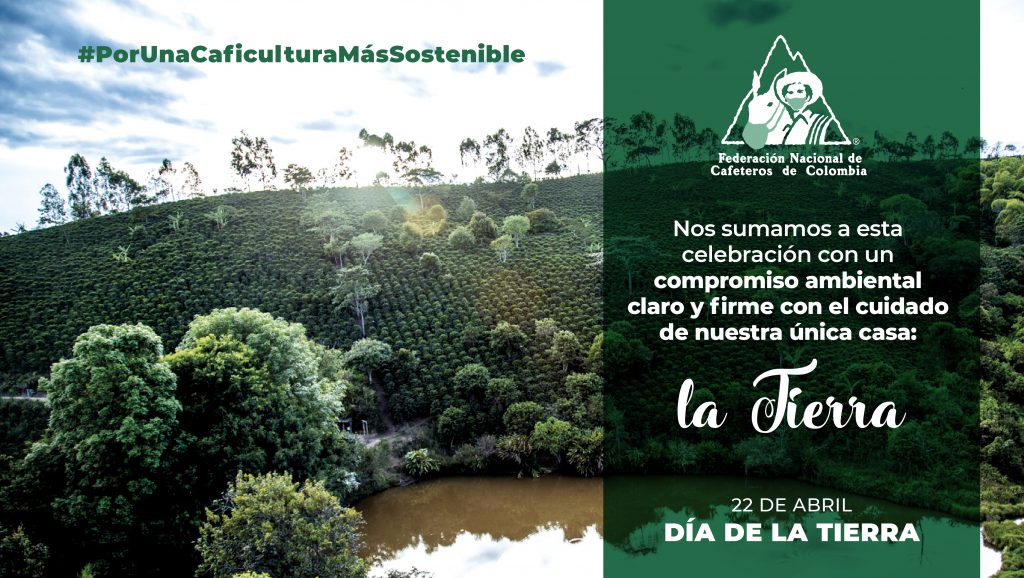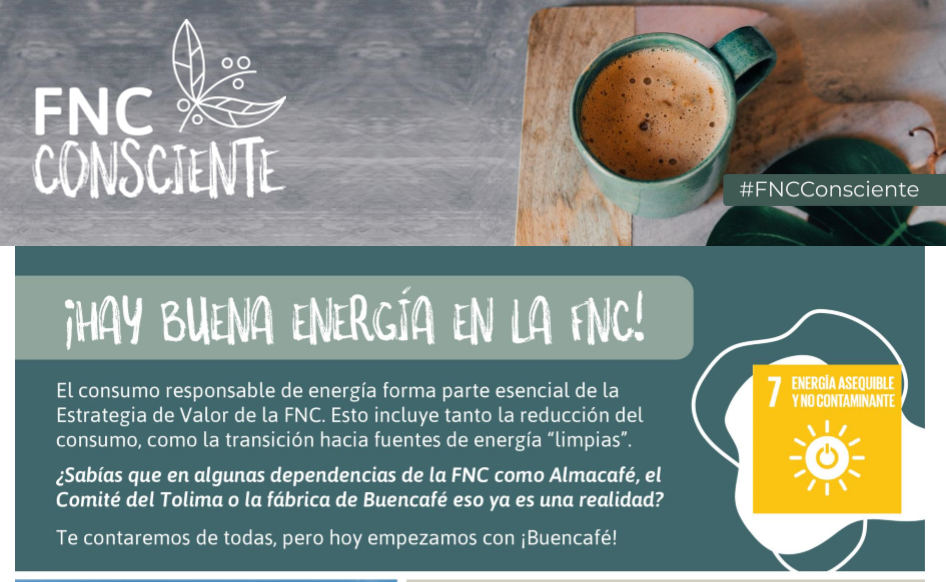Sustainability is at the heart of its value strategy

- “As a union, we wanted to join this celebration not just from speech and good intentions, but by showing that, with clear and firm environmental commitment, it is possible to contribute not two cents, but coffee beans, to the care of our only house: The Earth,” the FNC CEO, Roberto Vélez, said.
Bogotá, April 22, 2021 (FNC Press Office) – The Colombian Coffee Growers Federation (FNC) joined today the celebration of Earth Day with important progress in environmental matters.
The union assumes that one of the best ways to help raise awareness about the importance, or rather urgency, of caring for our planet is to lead by example.
“As a union, we have wanted to join this celebration not just from speech and good intentions, but by showing that, with clear and firm environmental commitment, it is possible to contribute not two cents, but coffee beans, to the care of our only home: The Earth,” the FNC CEO, Roberto Vélez, said.
As part of its value strategy, which also includes the economic, social and governance dimensions, environmental sustainability cross-cuttingly guides the FNC’s actions as a union and as an institution.
So much so that in 2020 Environmental Management at the FNC became a Directorate to strengthen natural resource care and deal with climate variability, both on coffee farms and at the organization.
A long-standing commitment
Among the coffee grower union’s many environmental advances, it’s noteworthy that, according to a rigorous study under the National Appropriate Mitigation Action (NAMA) concept, coffee farming in Colombia captures 5.2 times the carbon it emits.
Thanks to resources allocated by the FNC to R&D, its scientific arm, the National Coffee Research Center (Cenicafé), has contributed to development of cleaner and more eco-friendly coffee farming.
Developing rust-resistant varieties (84.1% of the planted area as of 2020) and promoting comprehensive management practices help rationalize use of fungicides, pesticides and herbicides, reducing their dispersion to the environment by wind or rain.
New technologies developed for coffee wet milling, including tub-tanks, Becolsub or Ecomill®, have made it possible to leave behind the traditional washing method and saved 10 billion liters of water per year (according to a new estimate on 653,000 farms), as well as reduced or even eliminated wastewater discharges.
Sustainable projects in coffee regions
Both at central level and through the 15 departmental committees of the FNC, in projects implemented with their own resources or co-financed by national and international partners, water savers, ecological wet mills and (coffee production and domestic) wastewater treatment systems have been implemented on thousands of coffee farms.
In 2020, for example, 277 pulp pits and 198 coffee wastewater treatment systems were installed as part of an inter-institutional project in Antioquia, and a project in Tolima provided 65 coffee growers with ecological wet mills (including pulp processors and vegetation filters) and 90 farmers received sanitary units (with septic tank included), among many other interventions.
As of 2020, 190,168 farms comply with at least one sustainability standard (a farm can meet several ones) for the benefit of 163,967 coffee growers, who also saw their effort rewarded with premiums worth COP 52.5 billion (USD 14.2 million) when marketing their sustainable and regional coffee.
FNC, increasingly environmentally conscious

The second pillar of the FNC’s environmental management strategy is focused on the institution itself, having set the roadmap in 2020 to become a more conscious and sustainable organization.
This included the launch of the internal awareness-raising campaign “FNCConscious,” which promotes responsible use and consumption among employees through tools such as the waste hierarchy: Prevent, Reduce and Reuse before Composting/Recycling or Discarding.
At the FNC HQ, a pilot was implemented with water savers at different points, which allowed saving 30% of water in the evaluated period. And both the Buencafé freeze-dried coffee factory and Cenicafé have already replaced their fluorescent lamps to have mercury-free lighting.
The Tolima coffee growers’ HQ launched a solar plant (on the roof) that generates about 147,000 kW/hour per year (thanks to the 300 panels installed over 582 m2) and avoids emitting 56 tons of CO2 per year. With this innovation, more than half of its energy will now be non-conventional renewable, and, thanks to outsourcing of the energy produced, an economic return will be obtained. Almacafé, the logistics arm of the FNC, also plans to install solar panels.
Buencafé saved COP 2 billion (USD 541,506) in natural gas consumption by increasing the share of renewable fuels from 19% in 2019 to 26% in 2020, thanks to a new biomass boiler (which produces heat by combustion of coffee grounds and hull), and COP 800 million (USD 216,603) by avoiding disposal of waste to sanitary landfill.
Only in 2018, this use of coffee grounds for its boilers saved Buencafé (and the union as a whole) COP 3.9 billion (USD 1.3 million), another clear example that economic issues are not at odds with environmental care or circular economy.
In 2020, Buencafé also made progress in wastewater management, since the pollutant load of effluents after being treated and before being discharged to the sewer is barely 411 mg/l measured as biological oxygen demand (BOD), well below the maximum allowed, 900 mg/l.
And with a new rainwater project for the cooling towers, 18,000 m3 were used (equivalent to 75 households’ consumption), which saved COP 40.8 million (USD 11,047).
Aligned with the environmental dimension of the FNC’s value strategy, all these actions are also tuned with its 100-100 Plan to achieve 100% sustainable coffee farming when the institution turns 100 years old in 2027.
Next week, the FNC will join in the celebration of Arbor Day also with important announcements and achievements in terms of reforestation and tree planting.
Check here the Management Report (Spanish version [and English coming soon]) for 2020, an unprecedented year due to the pandemic when the coffee grower union reported important results.

